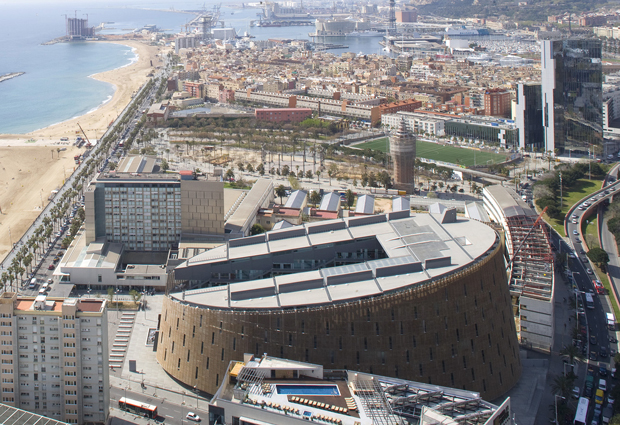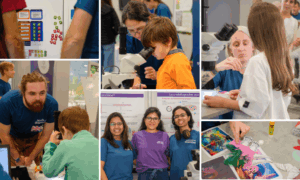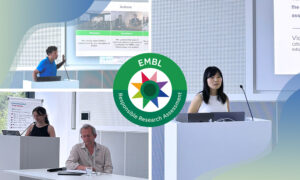
Behind the scenes: Building EMBL’s Barcelona site
Silke Schumacher, EMBL’s Director of International Relations, explains how the new EMBL site in Barcelona came into being

There is a natural sense of connection between EMBL and Barcelona. The city, which was honoured as the first European Capital of Innovation in 2014, is a national hub of life science research and has long promoted alliances between research centers and universities. So it is with a great sense of excitement that we await the opening of EMBL’s sixth site on 10 April, located on the Barcelona Biomedical Research Park (PRBB) – one of the most important campuses for translational research in Europe.
A great adventure
Getting to this stage has been a fascinating journey. EMBL has not launched a new site for more than 15 years, when EMBL’s Monterotondo site opened on the Italian National Research Council (CNR) campus. And there is no handbook detailing exactly how we go about setting up a new site – although perhaps now my team could write one. After more than a decade of complex – and often unpredictable – negotiations, we are now ready for the next chapter in this exciting adventure, which will eventually lead to the foundation of seven research groups and a core facility with a central focus: tissue biology.
Fortunately in creating EMBL’s Barcelona site, we have had some well-established foundations to build on. The seeds of EMBL’s new Barcelona site were planted in 2006, when the Spanish government generously set up and funded an EMBL partnership at the Centre for Genomic Regulation (CRG) in Barcelona. The aim of the EMBL-CRG System Biology Partnership Unit was to bring together EMBL’s expertise in computational biology with CRG capabilities in specific areas of genomics and proteomics to learn about key aspects of human health and disease.
Getting to this stage has been a fascinating journey – EMBL has not launched a new site for more than 15 years
The results have been tremendous. Research in the partnership covers a massive range of topics – from genetics to neuroscience, from the molecular to the cellular level. Initially headed by EMBL alumnus Luis Serrano, it has attracted several prestigious European Research Council grants, and in 2011 EMBL’s Scientific Advisory Committee awarded it top marks as part of its general review of the EMBL partnership programme.
With the value of the cooperation between EMBL and CRG clear, the Spanish government declared its willingness to invest further and host a new EMBL site, while keeping the EMBL-CRG collaboration running (staff will be employed by CRG or EMBL respectively). It was a clear demonstration of Spain’s commitment to boosting excellent science and forming even closer links with EMBL. The site’s specific focus on tissue biology ensures that the fundamental research focus of EMBL will complement the biomedical studies taking place on the PRBB campus.
Detailed negotiations
One of the most important steps was the preparation of a host site agreement between EMBL and Spain. Such agreements form the bedrock of all EMBL sites: it ensures the site becomes part of EMBL’s legal entity, providing comparable conditions to people working in other parts of EMBL. This required a lengthy negotiation process involving the government departments of foreign affairs, research, finance and social affairs. Negotiations began in parallel to the scientific plans being developed, discussed and approved by EMBL’s Council – both took many years to complete. But on 23 December 2016 came the moment we had all been working so hard towards – the Spanish Council of Ministers finally approved the host site agreement.
It means that staff at EMBL’s Barcelona site will be recruited under the same rules and regulations that apply elsewhere at EMBL – something that is crucial to our success as an organisation. Amongst many advantages, it means that EMBL staff members, fellows and their dependents remain visa exempt, wherever they come from in the world, enabling EMBL to recruit the very best scientists. The host site agreement will be signed on 10 April 2017 by Carmen Vela, Secretary of State of Investigation, Development and Innovation and Iain Mattaj, EMBL Director-General – in the presence of the Minister of Economy Luis de Guindos – at a special event in Barcelona.
Together, we can be proud of what we have achieved so far
Like other EMBL sites, EMBL’s Barcelona site will be funded through a mix of EMBL Member State contributions and external funding obtained through competitive calls. Spain is making a special contribution during the first years of the operations. And the CRG has agreed to provide services such as access to the CRG core facilities, IT and other services – also with support from the Spanish government. This will facilitate close collaboration from the outset as the new site grows to its full size, beginning with the recruitment of a head of site to launch operations and recruit initial administrative and research staff. Multi-talented teams from across EMBL will provide further logistical and administrative support – from hiring staff to building and maintaining IT networks.
An exciting future
Meanwhile, the EMBL-CRG partnership will be converted from a remote to a local partnership. In turn, the partnership will also be made even broader, with a view to establishing collaborations not only between groups located in Barcelona, but across the whole of EMBL. Together, we can be proud of what we have achieved so far. I look forward to witnessing the ongoing development of EMBL’s Barcelona site and the incredible results that will undoubtedly come from the research and service teams taking shape in the coming months and years.


